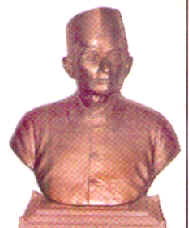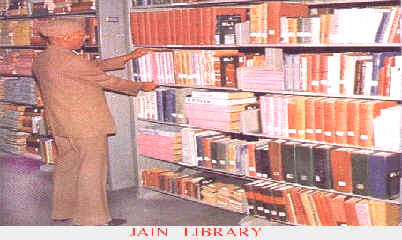Bhogilal Leherchand Institute of Indology
20th Km., G. T. Karnal Road, P. O. Alipur, Delhi-110036
 |
Acharya Vijay Vallabh Surishwarji Maharaj, known throughout India for his humanism and disciplined way of life, had, at the turn of the century, laid emphasis on education as an important means to dispel the darkness of ignorance form the minds of the people. In memory of his teachings a magnificent Smarak complex is developed in Delhi to commemorate the ideals he preached.
Bhogilal Leherchand Institute of Indology was started through the funds provided by the Trust of the Bhogilal family and the Atma Vallabh Smarak Shikshan Nidhi to sponsor and promote research in indology and aspects of Indian culture, objectives dear to Acharyaji,
The institute was first located at Patan in Gujarat - the native place of Shri Bhogilal Leherchand - in 1980 and was headed by the eminent Indologist, Dr. V. M. Kulkarni. However in 1984, inspired by the suggestion of the late vidushi Sadhvishree Mrigavatiji, it was shifted to the complex of the Vijay Vallabh Smarak at Delhi with a view to giving concrete shape, as expeditiously as possible to the ideal expressed by the revered Acharyaji.
The institute within the precincts of the Smarak at Delhi was inaugurated by Shri Pratap Bhogilal in the sacred and benign presence of the late Sadhviji Maharaj who bestowed her blessings on the Institute. However, the institute still maintains an Extension Center at Patan.
The first Director of the Institute at Delhi was Dr. N. R. Banerjee, former Director of the National Museum, Delhi.
 |
Aims and Objects : The academic programme of the Institute is to initiate, organize and give a fillip to research in Indological subjects in general and Jainological projects in particular.
Workshop, seminars and Lectures : With a view to introducing prakrit languages to a larger cadre of young scholars, the Institute organized a Prakrit Languages Workshop in June 1989 to which thirty students from all over India were Invited. The Institute plans to organize more such workshop and seminars. Eminent Sanskritis, Prakritists, Linguists and Grammarians gave lectures for four weeks. Those who lectured included Pandit D. D. Malvina, Prof. Prem Singh, Shri Jitendera Shah, Prof. K. R. Chandra and Prof. R. P. Jain.
A number of seminars on various topics have been sponsored and organized by the institute. The papers presented at some of these are being published.
The Bhogilal Leherchand Memorial Lectures has been a distinctive activity of the Institute. The topics selected have a bearing on Indology though having an emphasis on Jaina contribution.
Scholarships and Fellowships : There is an acute dearth of scholars with specialization in Prakrit and Jaina studies. With a view to attracting and encouraging young scholars and researchers to undertake these branches of study, the Institute has instituted scholarships at the graduate, the postgraduate and post-doctoral levels which have evoked a good response.
Research : Research projects based on Jaina Literature, epigraphs, monastic jurisprudence, Jaina writers referred to in commentaries, etc. are being worked upon. The institute has honoured Pandit D. D. Malvina by bestowing on him Emeritus Professorship as also other distinguished Indologists.
Library : The institute has a developing Library covering a floor area of 3000 sq.ft. It has about fifteen thousand books along with manuscripts and pothis, some of which are superbly illustrated. The work of cataloguing the manuscripts is in progress. The library has received, among other donations of about a hundred volumes on Indology from the Federal Republic of Germany. A microfiche collection will need to be added to the library. It is proposed to house the entire collection in the building of the institute. Both these will require generous donations. Permanent endowment of sumptuous funds is an urgent need.
Museum of Culture : There is a proposal to set a museum displaying art objects, manu scripts, Painting, Sculptures, estampages of inscriptions, blow-ups of Jaina monuments, etc. This will encourage students of Indology and interest general visitors.
Manuscript Collection : The Institute, as stated above, has a rich collection of nearly ten thousand manuscripts. They have been acquired from various Bhandaras including those brought over from Pakistan. Sadhvishree Suvratashreeji, assisted by other Sadhvis and shri Lachmandas Bhojak, have restored the old, damaged manuscripts and catalogued them. Some of the finest specimens of illustrated manuscrips will be displayed in the proposed museum.
The Liberary has acquired photocopies of 1500 selected manuscripts of Acharya Hemchandracharya Jain, Jnan Bhandar Patan. The Institute Plans to acquire copies from the Jaisalmer Bhandar, as well.
Future Plans : The Institute envisages to have a full time faculty of them of professors specialised in different branches of Indology. Research Fellowships will be offered to scholars in Indian universities for research in Jaina texts, comparative religion, Prakrit Jaina art and architecture, epigraphy, iconography and studies of contempory Jaina society.
Special emphasis will be laid on critical and analytical studies of prakrit languages and literature. Intensive instruction will be provided to students with a view to absorbing them in various universities.
The Liberary and the museum will be enlarged and housed in a building proposed to be constructed. Indian and fording scholars and lovers of Jaina studies will be provided with necessary facilities. The aim is to make the institute a centre of excellence for study and research in Indology in general and Jainology in Particular.
The Institute plans to engage scholars in various fields of Indology. All the above plans can be realized only through the generosity of those to whom Indology and Jainology are dear. The Jains are known for their love of supporting educational causes. Now is the time for all philanthoropists to contribute generously to a permanent endowment fund for the Institute. A big publication programme is already in progress which in years to come will accelerate.
The institute within the precincts of the Smarak at Delhi was inaugurated by Shri Pratap Bhogilal in the sacred and benign presence of the late sadhviji Maharaj who bestowed her blessings on the Institute. However, the Institute still maintains an Extension Center at Patan.
The first Director of the Institute at Delhi was Dr. N. R. Bajerjee, former Director of the National Museum, Delhi.
-----------------------------------------------------
Mail to : Ahimsa Foundation
www.jainsamaj.org
R10111